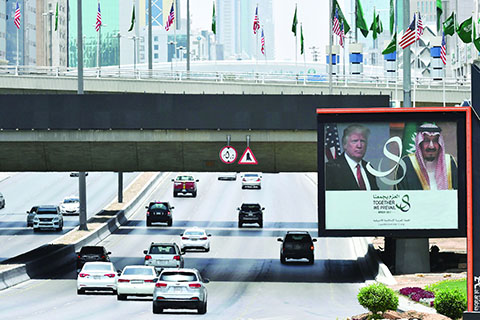 A giant billboard bearing portraits of US President Donald Trump and Saudi Arabia's King Salman, is seen on a main road in Riyadh, on May 19, 2017. Trump, on his first foreign trip since taking office in January, will tell Muslim leaders of his "hopes for a peaceful vision of Islam" as he seeks support for the war against radical Islamists, Washington has said. / AFP / GIUSEPPE CACACE
A giant billboard bearing portraits of US President Donald Trump and Saudi Arabia's King Salman, is seen on a main road in Riyadh, on May 19, 2017. Trump, on his first foreign trip since taking office in January, will tell Muslim leaders of his "hopes for a peaceful vision of Islam" as he seeks support for the war against radical Islamists, Washington has said. / AFP / GIUSEPPE CACACEWASHINGTON: As US President Donald Trump prepared to head to Saudi Arabia yesterday, Washington and Riyadh issued their first "joint terrorist designation"-blacklisting a Hezbollah leader. Hashem Safieddine was described by US officials as a key member of the executive council of Hezbollah, an Iranian-backed Lebanese armed movement which Washington has branded a "foreign terrorist organization."
His Highness the Amir Sheikh Sabah Al-Ahmad Al-Jaber Al-Sabah, accompanied by an official delegation, will depart the country today heading for Saudi Arabia. HH the Amir will head the State of Kuwait delegation at the 17th GCC Consultative Summit, the GCC-US Summit and the Arab-Islamic-US Summit, scheduled in the Saudi capital Riyadh.
"The Kingdom of Saudi Arabia joined the United States in designating Hashem Safieddine," the US State Department said in a statement. "As a result, any of his assets held in Saudi Arabia are frozen, and transfers through the Kingdom's financial sector, are prohibited."
Separately, the department's Bureau of Counterterrorism tweeted that this marked the "first-ever" State Department and foreign nation "joint terrorist designation", underlining the close cooperation between US and Saudi officials.
"The action against Safieddine is the latest example of the strong partnership between the United States and Saudi Arabia in combatting the financing of terrorism," the State Department said.
Extremist threat
The official Saudi news agency SPA confirmed Safieddine's listing, and alleged he had given his organization advice on carrying out terrorist acts and on supplying support to Syrian President Bashar Al-Assad's regime. Trump has chosen the kingdom as the venue of his first foreign presidential visit, and this weekend he will meet King Salman and address an audience of up to 50 leaders from across the Muslim world on the threat of extremism.
Safieddine, a Lebanese citizen who is in his 50s, is a known senior member of Hezbollah's executive council, which runs the group's political affairs and social and economic programs in Lebanon's community. The US designation order did not link him to any recent Hezbollah attacks, but noted the group's historical involvement in the 1983 bombing of a US Marines barracks in Beirut, a US embassy bombing in 1984 and a passenger jet hijacking in 1985.
In the same statement, the State Department also added Muhammad Al-Isawi-whom it said had taken over the leadership of the Islamic State group franchise in Egypt's Sinai peninsula in August 2016 -- to the sanctions list. As "specially designated global terrorists," Safieddine and Al-Isawi will see any assets they hold in areas under US jurisdiction frozen, and US citizens will be forbidden from any dealings with them. Separately but simultaneously, the US Treasury added two Yemeni tribal leaders, Hashim Muhsin Aydarus Al-Hamid and Khalid Ali Mabkhut Al-Aradah, to its own sanctions list, branding them leaders of Al-Qaeda in the Arabian Peninsula.
Arms sale
US officials say the Trump administration plans to announce $110 billion in advanced military equipment sales and training to Saudi Arabia this weekend as President Donald Trump visits the country. The package includes tanks, combat ships, missile defense systems, radar and communications and cybersecurity technology. The announcement is expected today. Officials providing details were not authorized to speak publicly and spoke on condition of anonymity.
Much of the package builds on commitments made before Trump took office. Separately yesterday, the administration informed Congress it will sell some $500 million in precision guided munitions to Saudi Arabia. The State Department says the munitions will improve Saudi targeting ability, particularly in Yemen where it has been criticized for civilian deaths in its fight against Iranian-backed rebels. - Agencies











